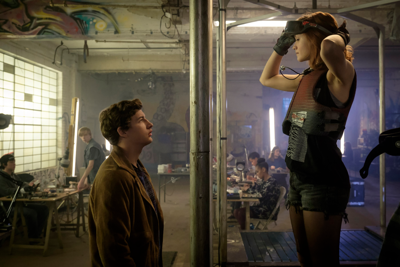
For the second time in four months, Steven Spielberg has made a film about the joys and responsibilities of a democratic institution that in real life is being overthrown by the agents of greed and corruption. As The Post sought to inspire viewers with the power of the press and then was released into a world where alt-right billionaires are buying papers and replacing their staff with content scrapple, Ready Player One similarly spends two hours and change glorying in the possibilities of a free and democratic internet, even as net neutrality stands to be gutted — April 23 looms, threatening to change the digital face of everything.
So Steven just can’t catch a break. Based on Ernest Cline’s bestselling novel, Ready Player One is a visual feast and an emotional desert. It’s empty in a way that feels alarming, grafting hero Wade Watts/Parzival (Tye Sheridan, unsettlingly blank) onto a quest narrative bound only by human imagination and heavily litigated copyright law. The prize is the Oasis, a virtual realm where anyone can be anything (what I wouldn’t give to see Spielberg directing an adaptation of the Cline novel by the Wachowski sisters), and the way to win is to search through the life of its creator, James Halliday (Mark Rylance, who is doing all the emotional heavy lifting), a socially awkward genius who retreated from reality into a space where he could exist within the toys, games, films and music of his youth.
Wade/Parzival is held up as significant because he’s done the work and knows more about James Halliday than anyone else, but what he knows is an assemblage of facts and statistics — digital markers that, yes, are part of who this Halliday was, but without the analog, without the breath or blood or humanity. It’s like that episode of Black Mirror, "Be Right Back," in that you can have access to everything someone wrote, and everything they saw, and what video games they dug — all the objective little bits that make up someone. But the random collisions, and moments of inexpressible thoughts and feelings that make it all fit together — they’re just not there in Wade’s conception of Halliday, and it’s not really there in Ready Player One.
So this is Steven Spielberg, crafting a portrait of creativity held prisoner by its own creation, in turn keeping its childhood prisoner as well. Say what you will about him, but he learned his lesson from A.I., and the poison apple of an ending here is immediately superseded by an appropriately stuff-oriented coda, so you don’t leave thinking about how regret is the engine that drove the staggering innovations of the Oasis.
The film’s futuristic Columbus, Ohio, is like a production of Rent in that it has immaculately designed squalor filled with signifiers that testify to the enduring power of the human spirit. The only economic system we see is Oasis-based, yet people have gardens, and some degree of resources. It’s a sci-fi dystopia that keeps its oppression almost completely in the abstract. For a world that the film insists people have given up on, it doesn’t look too terribly different from today. It’s a Warcraft engine, but it’s running in a space that has echoes of Neveldine and Taylor’s vastly underrated Gamer.
There are a lot of ’80s hits, most of them Robert Zemeckis-level obvious, though Bruce Springsteen’s “Stand on It” from the movie Ruthless People sticks out in a way that promises an interesting story somewhere. There’s a lot of nifty touches within, including a superb use of the PG-13 rating’s one-eff-word rule and some awesome critters and spacecraft puttering about. But this film uses The Iron Giant as a weapon, on which I have to call bullshit. Also, alleged sexual aggressor T.J. Miller pops up periodically to drop some of the film’s best lines even as he shatters the proceedings completely just by his presence, which is really something the filmmakers need to have addressed in some fashion.
Lena Waithe, who rules across any realm she enters, does very well considering she spends much of the film in the guise of a giant cyborc (an orc with cybernetic parts). Olivia Cooke, who is so good in Thoroughbreds (currently at a theater near you) it scares me, does the best she can with a part that is trying to move beyond the Manic Pixie Dream Girl archetype but still feels like another prize to be won in the film’s gamespace.
If all you want from Ready Player One is a Where’s Waldo hunt for icons, well, you will be ecstatic with all the stuff to find. But it just seems like there should be more. It’s briskly paced, and the visual pleasures are many, almost to the point of ridiculous. But you have to dig deep to find the emotional center, and it’s in the renegade artist who alternately hates and pities his creation — not the quest for stuff that keeps the fanboys battling.





